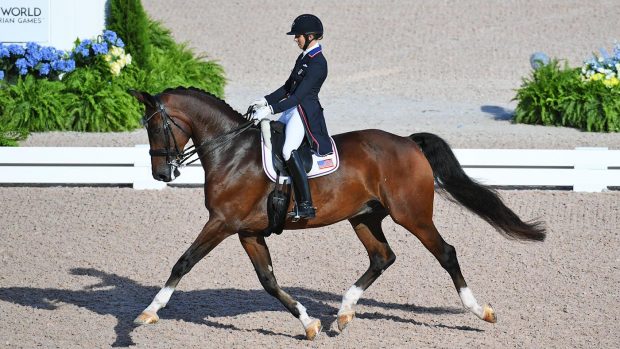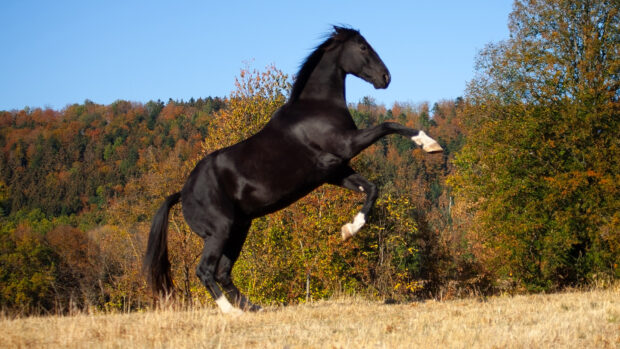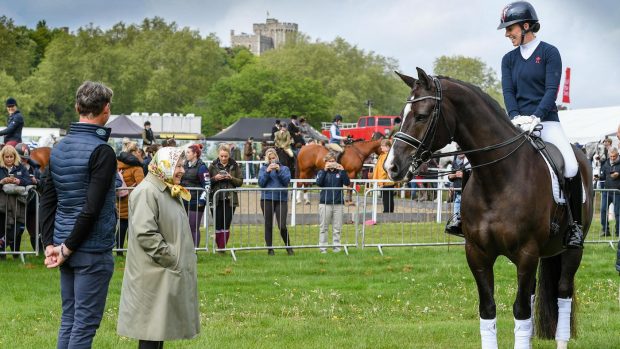A NEW vision and strategy to ensure horses have a good life in and out of competition is the aim to ensure good equine welfare – and public acceptance of involvement of horses in sport.
The FEI-appointed equine ethics and wellbeing commission made recommendations to the 2023 FEI sports forum (24–25 April).
H&H reported last year that the commission had carried out major research into the perception of horse sport, involving thousands of people inside the industry and the general public. It found that nearly three quarters of equestrians felt horse welfare in sport needs to be improved.
Commission chair Natalie Waran told H&H that there has since been “a huge amount of work”, going through the survey results, carrying out more analysis, meeting stakeholders and inviting feedback, all of which has contributed to the 24 recommendations presented.
“The commission has worked hard to develop a proposed vision and strategic approach to ensure a ‘Good Life for Horses’ and to sustain equine participation in sport now and into the future,” Dr Waran said.
“A good life for horses is easy to say, but there’s a lot underneath that, and an awful lot of work that will need to be done to fully think through what that means for a horse involved in sport.”
The specific recommendation is to publicly commit to ensuring a good life for horses, as the “fundamental tenet of an FEI equine wellbeing strategy”.
Dr Waran said it asks the FEI to commit to defining what that good life is, at competition and – as highlighted in the research – during the “other 23 hours” when horses are not at events.
She said there is much evidence already to inform what horses need and want in different environments, but questions such as how frequently horses should be transported, and what impact travelling can have, are among those that need to be answered to set out what a good life for horses looks like.
“People have told us that what happens outside competition is what they want to know about – there’s suspicion,” Dr Waran said. “We want to make sure there are clear guidelines around a good life outside competition and we’ve said there should be a way of auditing or monitoring that. We recognise some of these things may be difficult to implement, but it’s about accountability for those horses outside events. It’s the whole life of the horse that’s important.”
Other recommendations include continuing to develop ethical, evidence-based practices in all areas of horsemanship, and to establish and promote an equine ethics and wellbeing education programme for all equestrians.
Equestrian charter
An important one is an equestrian charter to which all stakeholders should commit.
“I believe it’s important for all equestrians – not just FEI-affiliated ones, anyone involved with horses – to stand up and be very clear in making that commitment to their horses,” Dr Waran said.
The commitment would include the recognition that horses are sentient beings, and that relationships or interactions with them come with responsibilities.
“It’s a privilege to be able to ride, drive, involve yourself in a horse’s life and part of that is ensuring you maintain your education, knowledge base and more to provide that good life,” she said, adding that on top of all a horse’s physical needs, such as for forage, freedom and friends, its mental state, to which all the physical needs contribute, is the most important.
As well as benefiting horses, fulfilling the recommendations should help secure public acceptance of equestrian sport, Dr Waran said. She explained that if the industry was at “tipping point”, one negative image or video, as has been seen before, can spread across the world almost instantly and have a hugely detrimental effect.
But, she said, if equestrianism can show this commitment to a good life for horses, underpinned with sound scientific evidence, education and commitment, all communicated well, then “if something comes along that looks like someone has done something awful, but public trust is higher, there’s more confidence that that’s a one-off, and it won’t have the same negative impact”.
She added as an example that in the past, there was huge public concern about the use of animals in medical research and major activism, including bombing. But “instead of being defensive, the research community said they needed to be open and transparent – ‘We’re doing good things, we’re saving lives, we’ve got rules and regulations and welfare is priority’. They built public trust and confidence.
“We’re in a situation where for involvement of horses in sport to continue, we need to keep thinking about perception,” Dr Waran said. “How people think is changing and if we’re not abreast of it, and addressing concerns, if we keep saying they need educating and don’t believe the surveys, if we don’t engage now – I think we’re at risk of losing our social licence. This addresses that it’s being on the front foot and making sure we’re retaining public support, that the welfare of these amazing animals is first and foremost in everything we do.”
The past month has been marked with warnings to the industry – the protests at the Grand National and Scottish Grand National and widespread debate relating to that.
But World Horse Welfare CEO Roly Owers told H&H: “Absolutely we can still do this. I think the commission’s work is a superb opportunity, and the recommendations are very exciting.”
Mr Owers said he has been struck by comments on people’s “broken relationship with animals”, which has relevance for equestrianism’s social licence. He “certainly doesn’t believe” our relationship with horses is broken, but “there are increasing questions and concerns”, which the industry must take seriously and address.
He said he was heartened by the positive response to and discussion of the recommendations at the sports forum – and pointed out that the commission’s survey results reflect others carried out on the same topic and so should not be ignored.
“This is far more than a PR exercise,” he added. “The sector needs to speak as much as we can with one voice, but this is about actions rather than words. It’s about trust, and the public and equestrian world will see words ringing hollow if they’re without substance.”
Control the narrative
H&H spoke to Richard Johnston-Smith, an experienced coach, who believes the industry needs to unite and “control the narrative”.
“I’ve been at events where social licence is discussed and change is made, but for me it’s quick decisions, small wins rather than looking at the bigger picture,” he said. “We seem a lot of the time to be on the back foot. How do we communicate all the good things about the industry? We need to be explaining why we train in a certain way and why we’ve changed how we do things.”
Mr Johnston-Smith said he is concerned by the number of equestrians he speaks to who have not heard of social licence.
“I explain that 20 years ago, it was acceptable to keep a killer whale in a tank and now it’s not,” he said. “Then I say that in 20 years’ time, we could potentially not be riding because of public acceptance, and that wakes people up.
“We should always be looking to improve our practices and communicate our messages, sharing pictures of us enjoying our horses and horses having a good life – we’re their custodians. Roly Owers talks about ‘Team Equestrian’, and in my eyes, that’s all of us.”
British Equestrian (BEF) CEO Jim Eyre told H&H ensuring equestrian activity and sport is ethical and of the highest welfare standards is “non-negotiable” for the BEF and its member bodies.
“Through establishing the equine welfare and ethics advisory group, we hope to develop guidance to promote the positivity of the equine/human interaction, common messaging on welfare issues and ensure equine wellbeing is paramount so that we share a united voice and purpose,” he said.
One potential cause for concern is pentathlon. Although riding will not be part of the competition at the 2028 Olympics, it will be in Paris next year.
Kate Allenby, who won pentathlon bronze for Britain at the 2000 Olympics, has previously spoken out about her concerns. She told H&H that as only the top few riders in many competitions progress to the riding phase, some are thrust on to the world stage, in front of cameras, who are not prepared. She feels this is dangerous for horse and rider safety, and the sport’s image as a whole.
“I’m anxious for Paris, as the public won’t differentiate between modern pentathlon and the wider equestrian community,” she said. “It’s one sport affecting the others. It’s so important to have athletes on the start line who have been properly assessed so horses and riders are safe, and it’s clear that’s not happening.”
Kate flagged a recent incident where a rider in a pentathlon World Cup event was eliminated for three run-outs, having appeared to have little control over his horse.
“In Britain, athletes will be out showjumping as part of their training, but other countries don’t do that,” she said. “So they don’t learn ringcraft, then they’re suddenly thrust into the Olympics, underprepared. They’re being let down.”
You might also be interested in:
Three quarters of riders think horse welfare needs improving

*Opinion* Scaremongering clickbait, or a very real threat to the sport we all love?

Why social licence matters, with World Horse Welfare | A Horse & Hound Podcast advertising special

Subscribe to Horse & Hound magazine today – and enjoy unlimited website access all year round
Horse & Hound magazine, out every Thursday, is packed with all the latest news and reports, as well as interviews, specials, nostalgia, vet and training advice. Find how you can enjoy the magazine delivered to your door every week, plus options to upgrade your subscription to access our online service that brings you breaking news and reports as well as other benefits.



